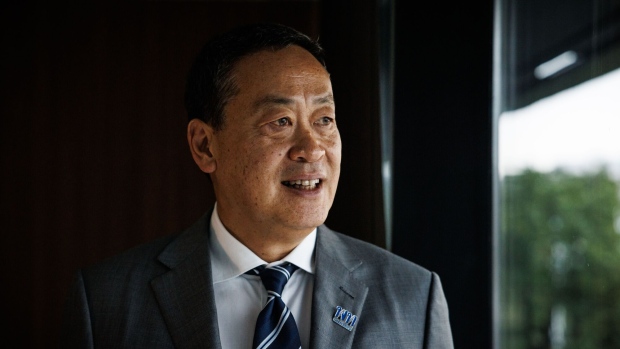Aug 20, 2023
Property Tycoon Bids to Emerge From Turmoil as Thailand’s Leader
, Bloomberg News

(Bloomberg) -- Srettha Thavisin, a former property tycoon, has become Thailand’s first new prime minister in nearly a decade.
Backed by a coalition of populist and conservative parties, Srettha won nearly two-thirds of lawmakers’ votes in a joint sitting of the House of Representatives and Senate on Tuesday. The election of the Pheu Thai Party’s candidate ends a three-month political gridlock that unnerved markets and sparked concerns of policy delays.
Srettha, 61, came into the race after the bid of Pita Limjaroenrat of Move Forward Party — which won the most House seats in the May 14 general election — was blocked by senators last month. Srettha’s victory on Tuesday came hours after billionaire Thaksin Shinawatra, a former premier who effectively helms Pheu Thai, ended his 15-year exile and flew home.
The new premier must now cobble together a cabinet whose members will be spread among the many coalition parties — a task which could take several weeks.
“I’m very honored to be selected Thailand’s 30th prime minister,” he said in a brief statement at party headquarters. “I will do my best and work tirelessly to elevate the well-being of all Thai people.”
Challenges awaiting the new premier include a society deeply polarized by post-election turmoil, a fragile economic recovery and household debt nationwide that has soared to a record high since a coup in 2014 lead to a near-decade of military-backed rule.
Who is Srettha?
The new prime minister spent more than 30 years in the real estate industry after earning an MBA from Claremont Graduate School in the US. Srettha joined Pheu Thai this year as chief adviser to Thaksin’s daughter Paetongtarn Shinawatra.
Srettha was a top executive at Sansiri Pcl since the late 1980s before resigning as president and chief executive in April. He exited the luxury property developer by transferring all his shares to his daughter. He has also sold or handed over his stakes in other companies to comply with Thai laws.
An avid soccer player and a fan of Liverpool FC in the English Premier League, the new prime minister was a driving force behind the Sansiri Academy, which trains aspiring local players. The six-foot-three Srettha is married to Pakpilai Thavisin, a specialist in anti-aging medicine. The couple has three children.
Long before he ventured into politics, Srettha was a vocal champion of LGBTQ rights and environmental sustainability, as he willingly made comments about the subjects on social media — unlike most Thai businessmen.
How did he become the top contender?
Despite a disappointing second-place finish for Pheu Thai in the general election in May, the party found a political opening after failed coalition-forming attempts by one-time partner Move Forward and its leader Pita, whose pledge to amend Thailand’s strict royal insult law and other reformist agendas left him with virtually no support from the pro-royalist Senate or conservative parties.
Pheu Thai went into gear to lead its own coalition, with the party choosing Srettha over Thaksin’s 37-year-old daughter as its candidate for prime minister.
What about allegations of tax evasion?
Chuvit Kamolvisit, a former businessman, alleged that Srettha was complicit in helping a group of people dodge taxes in 2019 when they sold a plot of land to Sansiri. Srettha has denied any wrongdoing and filed a 500 million baht ($14 million) defamation suit against Chuvit, who has also accused the company of other illegal land transactions.
The allegations pose no immediate threat to Srettha’s premiership, though they raise broader questions about how the real estate companies do business.
What are his priorities?
In an interview with Bloomberg earlier this year, Srettha said he wants to stimulate the economy that’s lagging the growth of its neighbors and bridge the gap between the rich and the poor using a “digital wallet” program that would give each Thai 16 years and older 10,000 baht.
Srettha will also have to address Pheu Thai’s campaign pledges such as a 70% hike in minimum wage, household income guarantee of 20,000 baht per month and tripling of farm profits to lift economic growth to 5%.
What are the challenges he will face?
Southeast Asia’s second-largest economy faces headwinds from a slowdown in China, which has hurt Thai exports and resulted in a slow return of tourists from China — the top source of visitors before the pandemic. It’s also grappling with a long-standing problem of high household debt that’s risen to about 90% of the nearly $500 billion economy.
Srettha will need to balance the interests of the conservative and military personalities that continue to hold a grip on Thai politics against the clamor of a younger voting base that in the May election gave the fledgling Move Forward Party the most seats in the lower house.
With Pheu Thai joining hands with a party backed by former junta leader Prayuth Chan-Ocha — who led the coup in 2014 that overthrew a previous Shinawatra-led government — Srettha must ensure his party’s base isn’t eroded. His government will also need to deliver on a promise to quickly rewrite the constitution to make Thailand more democratic.
How do investors view him?
Srettha and Pheu Thai are likely to be perceived favorably by investors given their pledge to stimulate the economy through state spending. That could boost growth in gross domestic product this year to more than 3%, the Thai Chamber of Commerce said on Tuesday.
The party also promised to cut electricity tariffs, push more free-trade agreements to attract foreign investments and take steps to legalize gambling, which is likely to be lauded by the market.
Foreign investors have dumped about $3.8 billion of Thai stocks this year, triggering a more than 7% slump in the main stock index to rank it among Asia’s worst performers.
--With assistance from Low De Wei, Suttinee Yuvejwattana and Anuchit Nguyen.
©2023 Bloomberg L.P.








